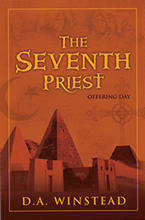Article first published as Book Review: The Seventh Priest: Offering Day by D.A. Winstead on Blogcritics.
July 30, 2012
The Seventh Priest: Offering Day
D.A. Winstead
AudioInk (2011)
New Novel Offers Ancient Mysteries and Embassy Intrigue in Sudan
 The Seventh Priest begins with Tony Rodder flying over the Sahara Desert on a return to Sudan to investigate a strange series of murders. As one of the State Department’s senior counter-terrorism advisors, Tony has previously done similar investigations in Sudan but with unsatisfactory results, including angering a British young lady, Dupris. Now he has returned, intent upon finding out the truth behind the recent series of murders believed to be carried out by Islamic extremists with chemical agents. Despite Sudan’s political upsets and tension between its Christian South and Islamic North, Tony has a hunch that the murders are based in something much more evil and mysterious than modern day political disputes.
The Seventh Priest begins with Tony Rodder flying over the Sahara Desert on a return to Sudan to investigate a strange series of murders. As one of the State Department’s senior counter-terrorism advisors, Tony has previously done similar investigations in Sudan but with unsatisfactory results, including angering a British young lady, Dupris. Now he has returned, intent upon finding out the truth behind the recent series of murders believed to be carried out by Islamic extremists with chemical agents. Despite Sudan’s political upsets and tension between its Christian South and Islamic North, Tony has a hunch that the murders are based in something much more evil and mysterious than modern day political disputes.
In Sudan, Tony is largely at the mercy of Chargé Lucy Kibbles, not quite an Ambassador but playing that role in the U.S. Embassy. Kibbles must have everything her way to the point of demeaning her co-workers and having total control over Tony’s movements and investigation; she even goes so far as to warn him to stay away from Dupris, the one woman who may have the information he needs to understand the mysterious killings.
When Tony tries to reach out to Dupris, she is at first resistant, feeling he betrayed her last time they tried to work together, but after setting her fears at rest, Tony convinces her to let him read her great-grandfather’s journals, which recount mysterious incidents he experienced in 1898, including a stream of albino rats coming out of a native’s mouth and attacking British soldiers. A series of unexplainable killings resulted in Dupris’ great-grandfather being blamed and put on trial in England for the violent death of several men. A broken and perhaps crazed man, Dupris’ great-grandfather returned to Sudan, obsessed with trying to understand what had really happened on that fatal day. Tony, seeing the parallel between events in Dupris’ great-grandfather’s day and the current killings, hopes the journals will lead him to the answers her great-grandfather failed to find.
Crazy Grace—so named for her obsession with Dupris’ great-grandfather’s story, ancient mythology, and coffin texts from the Island of Meroe—is enlisted to aid Tony and Dupris in their quest to find the evil source behind the killings. Will they find the answers they seek in old journals and ancient myths, or will the killings continue? When one of Dupris’ friends becomes the potential victim of the evil behind the murders, they must act quickly to stop more violence from occurring. With political tensions high and continued peace between Khartoum and Juba in jeopardy, this unlikely trio will unearth an ancient secret that will change everyone’s understanding of Sudan’s political situation.
Author D.A. Winstead does a fine job of building suspense, of detailing the political and religious tension between factions, and of depicting the main characters’ conflicting feelings for each other. His use of ancient texts and century-old journals add an element of mystery from the past, reflecting how old prejudices and misunderstandings between East and West, Christian and Muslim, Sudanese and British, and North and South Sudan continue to effect the present. The story has all the elements of a satisfying storyline with the characters especially standing out. From a blind religious leader, to whirling dervishes, and a manipulative would-be ambassador, Winstead’s characters create plenty of variety while frequent scene shifts maintain the novel’s pacing and the reader’s interest.
Despite the intriguing storyline, what I most enjoyed about The Seventh Priest was the depiction of the ins-and-outs of the U.S. State Department and the role of a U.S. Embassy overseas. Winstead provides insight into political workings few Americans have the opportunity to witness first-hand. We see the U.S. Government’s presence overseas, its embassies’ good intentions, misunderstandings and false premises about other cultures, and the interior hierarchical system that can prevent officials from carrying out their duties as well as intended. While the reader must remember these depictions are fictional, Winstead makes them ring true by creating a believably tense, frustrating, yet sometimes humorous depiction of U.S. overseas politics.
Ancient bloodlines, political intrigue, supernatural events, and unforgettable characters all add up to make The Seventh Priest a modern day King Solomon’s Mines with a sprinkle added of The Da Vinci Code. Readers of adventure will be sure to appreciate this debut novel by D.A. Winstead, and they will be equally happy to learn it is the first in his planned Kings and Queens series. With its unfamiliar yet intriguing settings and blending of ancient mythology, this series is one I will look forward to reading.
— Tyler R. Tichelaar, Ph.D., and author of the award-winning Narrow Lives

